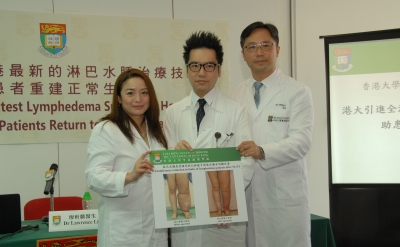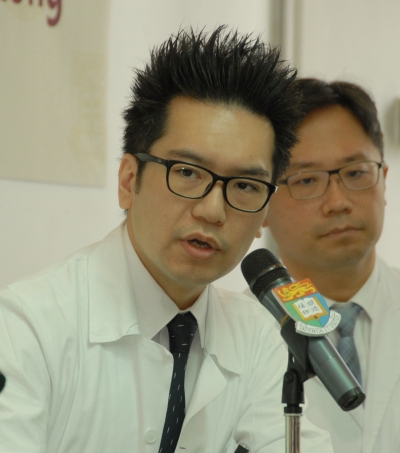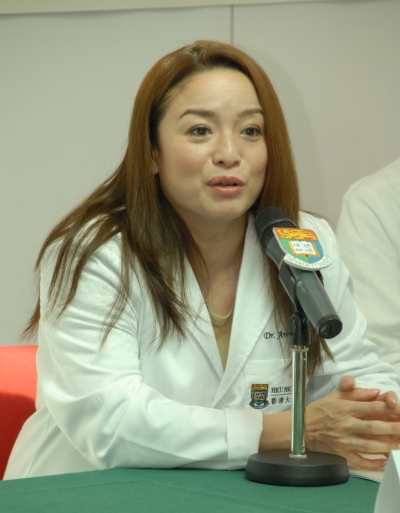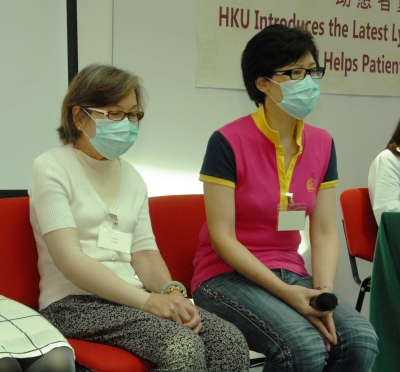HKU Introduces the Latest Lymphedema Surgery to Hong Kong and Helps Patients Return to Normal Life
28 Jun 2016
Lymphatic drainage is a very popular treatment among women in recent years, but it is not related to treatment for lymphedema in medical arena. Lymphedema is commonly caused by lymphatic obstruction in axilla and groin due to treatments for breast and gynaecological cancers. Lymphedema does not go away on its own. Some patients with severe symptoms present with swollen legs, hardened skin and lymph leak, which seriously affect their social and daily life. Department of Surgery of Li Ka Shing Faculty of Medicine, The University of Hong Kong (HKU) introduced the latest lymphedema surgeries, Lymphaticovenous Anastomosis (LVA) and Vascularised Lymph Node Transfer (VLNT), to Hong Kong in 2012 and 2013 respectively. By applying supermicrosurgery and free tissue transfer techniques, HKU experts successfully rebuild the lymphatic system of lymphedema patients and help them return to normal life.
Lymphedema
Lymphatic system is a part of the body’s immune system. It is a network formed by numerous lymphatic vessels which transport lymph throughout the body like a river. It filters and removes harmful bacteria and virus, protecting the body from infection. If lymphatic vessels or lymph nodes are impaired or damaged, circulation of lymph will be blocked and lymph will be retained under the skin, causing swelling, or lymphedema in medical terms. While lymphedema can be classified into congenital and secondary, most patients in Hong Kong belong to the latter one. Treatments for breast cancer and gynaecological cancer may damage lymph nodes and cause lymphedema, with a prevalence rate ranging from 5% to 45%. Similar to other human organs, lymphatic system does not regenerate after being damaged; patients therefore do not recover from lymphedema without intervention.
Early lymphedema is reversible as fibrosis and thickening of tissues have not been developed. Severe lymphedema, which is irreversible, is characterised by worsened fibrosis, thickened skin and severe swelling. Lymphedema causes recurrent infection and lymph leak, leading to inconvenience to patients. Swollen limbs may also create difficulty in walking and social embarrassment.
Treatment for lymphedema
There used to be no radical cure for lymphedema. Physiotherapy was the most common treatment for lymphedema before the introduction of lymphedema surgery. Physiotherapists relieve the symptoms of lymphedema by compression therapy, including manual lymphatic drainage and bandaging. Physiotherapy is mostly applicable to patients with early lymphedema. Its efficacy is rather limited in severe lymphedema patients.
Introduction of the latest lymphedema surgeries by HKU
With the advancement in microsurgery, HKU introduced Lymphaticovenous Anastomosis (LVA) and Vascularised Lymph Node Transfer (VLNT) to Hong Kong in 2012 and 2013 respectively and bring new hopes to lymphedema patients. The first LVA case in Hong Kong was operated in May 2012. Plastic surgeons make skin incision of 2 cm in disease limb and make connections between subdermal lymphatics and venules to re-establish the normal lymphatic flow.
VLNT can cure lymphedema patients through free tissue transfer techniques. For patients with upper limb lymphedema, surgeons transplant the free flap containing lymph nodes from groin to axilla, where lymphatic system is obstructed. On the other hand, the free flap with lymph nodes is transplanted from axilla to groin, where the lymphatic circulation is blocked, for patients with lower limb lymphedema. “The transplanted lymphatics can absorb excessive lymph through its pumping action. They also release growth factors that stimulate lymphangiogenesis. VLNT has been operated in 34 lymphedema patients since 2013 and circumference reduction has been shown in 70-80% of patients,” said Dr Lawrence Liu Hin-lun, Associate Consultant of Department of Surgery, Tung Wah Hospital, and Honorary Clinical Assistant Professor of Department of Surgery, Li Ka Shing Faculty of Medicine, HKU.
Lymphedema Service
Queen Mary Hospital established a lymphedema clinic in July 2012 to provide proper treatment for lymphedema patients. The first Lymphedema Multi-care Management Programme harnessing different healthcare professionals, including plastic surgeons, breast surgeons, physiotherapists and nursing specialists, was set up in September 2015 in Tung Wah Hospital, and it offers the most advanced and comprehensive one-stop medical treatment to lymphedema patients.
Dr Ava Kwong, Clinical Associate Professor of Department of Surgery, Li Ka Shing Faculty of Medicine, HKU, said, “Lymphedema is one of the common complications after the surgery of breast cancer and gynaecological cancer. The Lymphedema Multi-care Management Programme offered by Tung Wah Hospital provides one-stop medical consultation and assessment, surgery treatment, as well as physiotherapy services to the patients. From now on, patients do not need to run around to different divisions of the hospital to receive the services. All the healthcare professionals of the programme have the latest knowledge and technology of lymphedema, and they understand what the patients want. These are the top priority for lymphedema patients.”
To use the press release photo(s) for any publishing, publicity and related purpose, photo courtesy should be given to “Li Ka Shing Faculty of Medicine, The University of Hong Kong”

(From left) Dr Ava Kwong, Clinical Associate Professor of Department of Surgery, Li Ka Shing Faculty of Medicine, HKU; Dr Lawrence Liu Hin-lun, Associate Consultant of Department of Surgery, Tung Wah Hospital, and Honorary Clinical Assistant Professor of Department of Surgery, Li Ka Shing Faculty of Medicine, HKU; and Dr Chan Yu-wai, Clinical Associate Professor of Department of Surgery, Li Ka Shing Faculty of Medicine, HKU.

Dr Lawrence Liu Hin-lun, Honorary Clinical Assistant Professor of Department of Surgery, Li Ka Shing Faculty of Medicine, HKU says, “HKU introduced the latest lymphedema surgeries to Hong Kong which successfully rebuilds the lymphatic system of lymphedema patients and helps them return to normal life.”

Dr Ava Kwong, Clinical Associate Professor of Department of Surgery, Li Ka Shing Faculty of Medicine, HKU points out that HKU provides support to the first Lymphedema Multi-care Management Programme in Hong Kong harnessing different healthcare professionals, including plastic surgeons, breast surgeons, physiotherapists and nursing specialists.

The right arm of lymphedema patient Ms Ho (left) has stopped swelling after receiving Lymphaticovenous Anastomosis (LVA) surgery. Another patient Ms Lau (right) returns to normal life after receiving Vascularised Lymph Node Transfer (VLNT).
